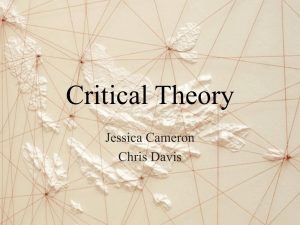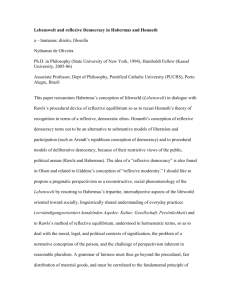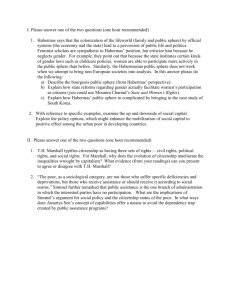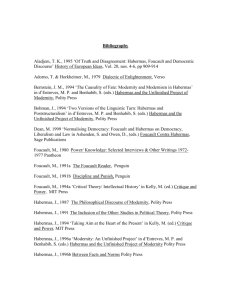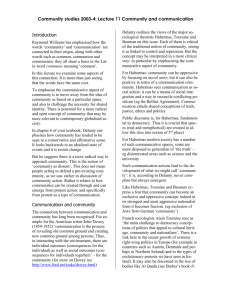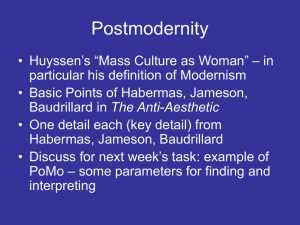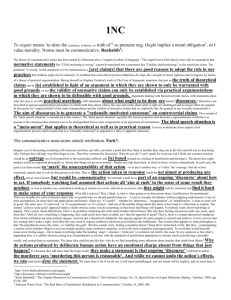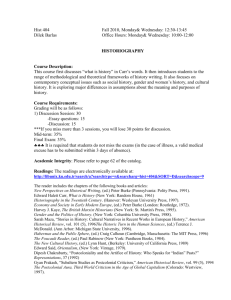mit discourse
advertisement
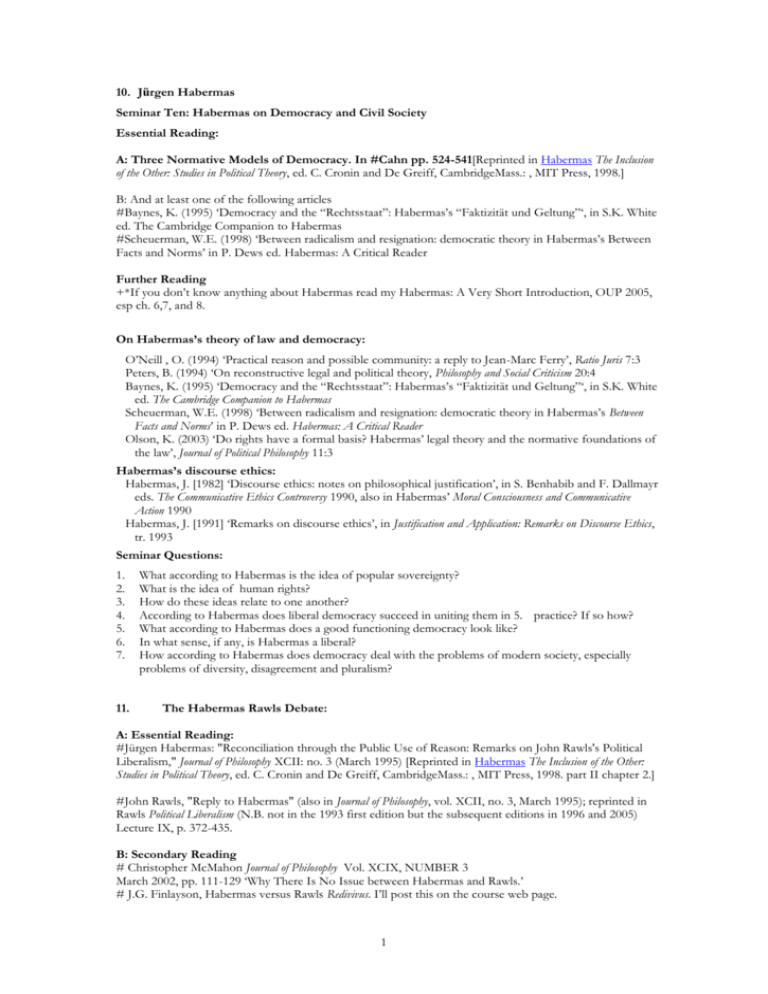
10. Jürgen Habermas Seminar Ten: Habermas on Democracy and Civil Society Essential Reading: A: Three Normative Models of Democracy. In #Cahn pp. 524-541[Reprinted in Habermas The Inclusion of the Other: Studies in Political Theory, ed. C. Cronin and De Greiff, CambridgeMass.: , MIT Press, 1998.] B: And at least one of the following articles #Baynes, K. (1995) ‘Democracy and the “Rechtsstaat”: Habermas’s “Faktizität und Geltung”‘, in S.K. White ed. The Cambridge Companion to Habermas #Scheuerman, W.E. (1998) ‘Between radicalism and resignation: democratic theory in Habermas’s Between Facts and Norms’ in P. Dews ed. Habermas: A Critical Reader Further Reading +*If you don’t know anything about Habermas read my Habermas: A Very Short Introduction, OUP 2005, esp ch. 6,7, and 8. On Habermas’s theory of law and democracy: O’Neill , O. (1994) ‘Practical reason and possible community: a reply to Jean-Marc Ferry’, Ratio Juris 7:3 Peters, B. (1994) ‘On reconstructive legal and political theory, Philosophy and Social Criticism 20:4 Baynes, K. (1995) ‘Democracy and the “Rechtsstaat”: Habermas’s “Faktizität und Geltung”‘, in S.K. White ed. The Cambridge Companion to Habermas Scheuerman, W.E. (1998) ‘Between radicalism and resignation: democratic theory in Habermas’s Between Facts and Norms’ in P. Dews ed. Habermas: A Critical Reader Olson, K. (2003) ‘Do rights have a formal basis? Habermas’ legal theory and the normative foundations of the law’, Journal of Political Philosophy 11:3 Habermas’s discourse ethics: Habermas, J. [1982] ‘Discourse ethics: notes on philosophical justification’, in S. Benhabib and F. Dallmayr eds. The Communicative Ethics Controversy 1990, also in Habermas’ Moral Consciousness and Communicative Action 1990 Habermas, J. [1991] ‘Remarks on discourse ethics’, in Justification and Application: Remarks on Discourse Ethics, tr. 1993 Seminar Questions: 1. 2. 3. 4. 5. 6. 7. 11. What according to Habermas is the idea of popular sovereignty? What is the idea of human rights? How do these ideas relate to one another? According to Habermas does liberal democracy succeed in uniting them in 5. practice? If so how? What according to Habermas does a good functioning democracy look like? In what sense, if any, is Habermas a liberal? How according to Habermas does democracy deal with the problems of modern society, especially problems of diversity, disagreement and pluralism? The Habermas Rawls Debate: A: Essential Reading: #Jürgen Habermas: "Reconciliation through the Public Use of Reason: Remarks on John Rawls's Political Liberalism," Journal of Philosophy XCII: no. 3 (March 1995) [Reprinted in Habermas The Inclusion of the Other: Studies in Political Theory, ed. C. Cronin and De Greiff, CambridgeMass.: , MIT Press, 1998. part II chapter 2.] #John Rawls, "Reply to Habermas" (also in Journal of Philosophy, vol. XCII, no. 3, March 1995); reprinted in Rawls Political Liberalism (N.B. not in the 1993 first edition but the subsequent editions in 1996 and 2005) Lecture IX, p. 372-435. B: Secondary Reading # Christopher McMahon Journal of Philosophy Vol. XCIX, NUMBER 3 March 2002, pp. 111-129 ‘Why There Is No Issue between Habermas and Rawls.’ # J.G. Finlayson, Habermas versus Rawls Redivivus. I’ll post this on the course web page. 1 Seminar Questions: 1. 2. 3. 4. What are Habermas’s chief objections to Rawls? Are they good? What are Rawls’s objections to Habermas? Who, if anyone, gets the better of the exchange? On what grounds does McMahon argue that there is no real issue between them? Is he correct? 5. Is there an Issue between Rawls and Habermas? 6. On what grounds does McMahon claim there is no issue between Rawls and Habermas? Is he right? If not, what is the issue? Further Reading *Thomas McCarthy ‘Kantian Constructivism and Reconstructivism: Rawls and Habermas in Dialogue’ Ethics 105, 1994, pp. 44-63 *Reasonable Democracy: Jürgen Habermas and the Politics of Discourse, Simone Chambers (Ithaca, Cornell University Press, 1996). Finlayson, G. (2005) Habermas: A Very Short Introduction, chs. 6-7 Additional texts: Habermas, J. [1992] Between Facts and Norms: Contributions to a Discourse Theory of Law and Democracy, ch. 3 (esp. from 3.1.2 onwards) Habermas, J. (1988) ‘Law and morality’, Tanner Lectures on Human Values 8 Introductions to Habermas: Outhwaite, W. (1994) Habermas: A Critical Introduction, ch. 3 ‘Communication and discourse ethics’ and ch. 9 ‘Law and the state’. Finlayson, G. (2005) Habermas: A Very Short Introduction, chs. 6-7. Heath, J. Communicative Action and Rational Choice, MIT Press 1999 Chambers S. Reasonable Democracy. 12. The Feminist Critique of Liberalism Essential Reading: #‘The Generalized and the Concrete Other: The Kohlberg-Gilligan Controversy and Feminist Theory’ in S. Benhabib, Situating the Self: Gender, Community and Postmodernism in contemporary Ethics. London, Routledge (1992). #Maihofer, A (1998). ‘Care’ in A. Jaggar and I. M. Young (eds.), (1998). A Companion to Feminist Philosophy. Oxford, Blackwell. (Different versions of the Benhabib’s article can be found elsewhere: ‘The Generalized and the Concrete Other: The Kohlberg-Gilligan Controversy and Feminist Theory’ in S. Benhabib and D. Cornell (eds.) (1987): & Benhabib (1986). ‘The Generalized and the Concrete Other: The Kohlberg-Gilligan Controversy and Feminist Theory’. Praxis-International 5/4: 402-424.) It would be good if you took a look at Rawls’s remarks on Benhabib in Political Liberalism. See index to the new material, Seminar Questions: 1. What Objections does Benhabib make? 2. At whom or what are they directed? 3. What political implications do they have, if any? 4. What is the distinction between generalized and concrete others? 5. Is the distinction temable? 6. Does it give rise to any criticisms that can be directed at liberalism? 2 Further Reading: Benhabib S. and Cornell D. (eds.) (1987). Feminism as Critique. Essays on the Politics of Gender in Late-Capitalist Societies. London, Polity Press. Blum, L. (1998). ‘Gilligan and Kohlberg: Implications for Moral Theory’, Ethics 98: 472-491. Benhabib S. ‘The Debate over Women and Moral Theory Revisited’ in S. Benhabib, Situating the Self: Gender, Community and Postmodernism in contemporary Ethics. London, Routledge (1992). Dean, J. (1995). ‘Discourses in Different Voices’ in J. Meehan (ed.) (1995). Flanagan O. and Jackson K. (1987). ‘Justice Care and Gender: The Kohlberg-Gilligan Debate Revisited’ Ethics 97: 622-37. Fraser, N. (1995). ‘What is Critical about Critical Theory’ in J. Meehan (ed.) 1995. Gilligan (1982). In a Different Voice: Psychological Theory and Women’s Development. Cambridge Massachusetts, Harvard University Press - (1986). ‘Remapping the Moral Domain’, in T. Heller, M. Sosna, and D. Wellbury (eds.), Reconstructing Individualism: Autonomy, Individuality, and the Self in Western Thought. Stanford California, Stanford University Press. Joanna Meehan (ed.) Feminists Read Habermas. London, Routledge (1995). Kymlicka, W. (1989). Liberalism, Community and Culture. Oxford, Clarendon Press. Okin, S. (1989). Justice, Gender and the Family. New York, Basic Books. - (1989a). ‘Reason and Feeling in Thinking about Justice.’ Ethics 99/2: 229-49. 13. Week 4. Lecture Only. Tips on Examination Technique . Revision & Q and A session. No seminars. 3

